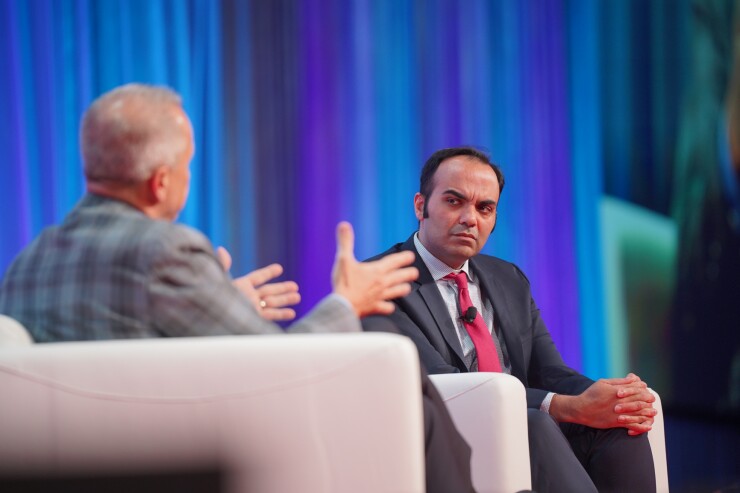WASHINGTON — The Consumer Financial Protection Bureau is plowing ahead with a busy enforcement agenda despite a cloud of uncertainty hanging over it from the Supreme Court's decision to take a case challenging the bureau's funding.
The CFPB said it was "pleased" that the Supreme Court had
"We don't want a situation where there are financial institutions all over the country getting sued because of a lack of clarity on the validity of actions," Chopra said at the Credit Union National Association's Governmental Affairs Conference in Washington, D.C., on Monday. "I'm hopeful that this is the next step to create that clarity, and we'll let the process go forward."
The CFPB had
Chopra made clear that the agency is continuing its enforcement. The bureau in 2010 faced a similar period of limbo when the Supreme Court accepted a constitutional
"I will be very clear that we are not holding back when it comes to our enforcement program," Chopra said. "We do know that many repeat offenders [and] bad actors want to use this to escape liability and accountability, and we are not holding back on that front."
But the CFPB also faces significant litigation risks if the high court finds that the bureau's funding is unconstitutional. Financial firms that have paid billions in settlements may ask the CFPB to return their money, lawyers said. Even some attorneys that have been highly critical of the CFPB said that situation would be chaotic.
Joe Lynyak, a partner at Dorsey & Whitney LLP, said the Supreme Court will have a hard time finding that the CFPB's funding is unconstitutional because doing so would automatically mean financial firms that have paid roughly $14.9 billion to the CFPB in past settlements may sue to get their money back.
"If the CFPB is declared to be unconstitutional then all its actions from the past 10 years are void, and from a practical perspective, courts do not favor this result," Lynyak said. "It would open up a whole new can of worms, including the enforceability of any payments made to injured consumers."
Isaac Boltansky, managing director and director of policy research at the investment bank BTIG, listed nearly a dozen companies that stand to benefit from a ruling against the CFPB because they currently face enforcement actions or pressure from CFPB regulations.
"From a practical perspective, this means that the cloud of uncertainty will remain over the Bureau's rulemaking and enforcement actions," Boltansky wrote in a research note.
He thinks the CFPB faces even more litigation because of the court case. The bureau will likely be sued once it finalizes its proposal to regulate credit card late fees, he said.
"The CFPB will still push to finalize its credit card late-fee rule this year, but that would likely be challenged on its own grounds and could be overshadowed by the funding mechanism review," Boltansky said.
Roughly a dozen CFPB enforcement cases have been stayed since the 5th Circuit's ruling in October. Boltansky said that the CFPB may end up partnering with state attorneys general "to provide more legal staying power" to its enforcement actions, Boltansky said.
Richard Hunt, a senior advisor to Boston Consulting Group, said that if the Supreme Court decides that the bureau's funding is unconstitutional, the core issue will be how the high court "defines a remedy." Many experts think a Supreme Court decision against the CFPB could require bipartisan legislation by a closely divided Congress just months before a presidential election.
"Fast-forward a year from now, and the Supreme Court could rule in June or July 2024," said Hunt, a former CEO of the Consumer Bankers Association. "A decision could come out just before an election year that changes the whole bailiwick."
Hunt said he is concerned about the time period between a high court ruling and when Congress would have to act on the bureau's funding even as he acknowledged that there are more questions than can be answered about how Congress might respond if the CFPB loses.
"There are probably 20 questions that are unanswerable right now. Is there a remedy for past actions? Will Congress compromise to keep the agency afloat?" he said. "If Jan. 2, 2025, comes around and Congress has not passed any funding for the CFPB, does it exist or not?"
Consumer advocacy groups also are raising a flurry of concerns about what could happen if Congress ties the CFPB's funding to congressional appropriations.
"If the CFPB has to rely on congressional funding, the banking industry could try to influence members of Congress to withhold funding from regulators unless they do their bidding," said Mike Litt, consumer campaign director at U.S. PIRG. "Making the CFPB the only banking regulator subject to congressional appropriations would put the most pro-consumer federal agency at risk of being starved of the funding it needs to protect consumers."
Financial firms also face larger questions about whether they would have to jettison compliance and risk management programs that were created around the CFPB's rules.
"To unwind the large compliance and risk management structures that companies have already built over many years on reliance of these expectations would be itself a huge undertaking that would ironically detract from the goal of efficient regulation," said Jenny Lee, a partner at Reed Smith LLP and a former CFPB enforcement attorney. Lee said that any remedy in the Supreme Court could require a congressional solution "which is not an easy lift in today's environment."








